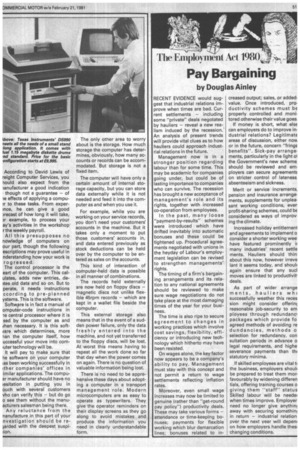The Employment Act 1980„
Page 57

If you've noticed an error in this article please click here to report it so we can fix it.
Pay Bargaining
by Douglas Ainley
RECENT EVIDENCE would suggest that industrial relations improve when times are bad. Current settlements — including some "private" deals negotated by hauliers — reveal a new realism induced by the recession.' An analysis of present trends will provide vital clues as to how hauliers could approach industrial relations in the future.
Management now is in a stronger position regarding labour than for some time. This may be academic for companies going under, but could be of lasting importance to companies who can survive. The recession has brought a new acceptance of management's role and its rights, together with increased co-operation from employees.
In the past, many loose "payment-by-results" schemes were introduced which have drifted inevitably into automatic bonuses and these could be tightened up. Procedural agreements negotiated with unions in the heyday of Labour's employment legislation can be revised to strengthen managements' rights.
The timing of a firm's bargaining arrangements and its relation to any national agreements should be reviewed to make sure wage negotiations do not take place at the most damaging times of the year for your business.
The time is also ripe to secure agreement to changes in working practices which involve cost savings, flexibility, efficiency or introducing new technology which hitherto may have been resisted.
On wages alone, the key factor now appears to be a company's ability to pay. Management must stay with this concept and not permit a return to wage settlements reflecting inflation rates.
Moreover, even small wage increases may now be limited to genuine (rather than "get-round pay policy") productivity deals. These may take various forms — attendance or time-keeping bonuses; payments for flexible working which blur demarcation lines; bonuses related to in creased output; sales, or addedvalue. Once introduced, productivity schemes must be properly controlled and monitored otherwise their value goes If money is short, what else can employers do to improve industrial relations? LegitimatE areas of discussion, either now or in the future, concern "fringE benefits". Sick-pay arrangements, particularly in the light oi the Government's new scheme should be reviewed and employers can secure agreementE on stricter control of lateness, absenteeism and sickness.
Merit or service increments, pension and insurance arrangements, supplements for unpleasant working conditions, even profit-sharing schemes, could bE considered as ways of improving the climate.
Increased holiday entitlement and agreements to implement o consider a shorter working wee! have featured prominently ir many industries' recent settle ments. Hauliers should thin. about this now, however irreve lant it seems today, and shoul( again ensure that any sucl moves are linked to productivit, deals.
As part of wider arrange merits, hauliers wh( successfully weather this reces sion might consider offerinc reasonable job-security to em ployees through redundanc■ packages which provide fo agreed methods of avoiding re dundancies, methods o selection for redundancy, con sultation periods in advance o legal requirements, and highe severance payments than th( statutory minima.
If skilled employees are vital ti the business, employers shouls be prepared to treat them mon favourably by widening differen tials, offering training courses o giving them "staff" status Skilled labour will be needed when times improve. Employer need no longer give anythini away with securing somethini in return — industrial relation over the next year will depere on how employers handle the& changing conditions.
































































































